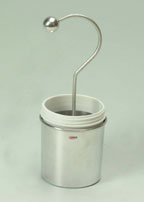Leyden Jar, Convenient for many electrostatic demonstrations., Each

$ 29.59
|
|
Details:
Stores charges from an electrostatic generator.When charged, electricity is stored in the polarization of the dielectric jarTaking the jar apart leads to an apparent disappearance of the charge — none of the components seem to have itReassembling the capacitor causes the charge to reappear — energy is stored in the dielectric jarOrder InfoSize: 3.4 in. dia. (8.5cm); 7.5 in. (19cm).
Additional Information
| SKU | 1331763 |
|---|---|
| UOM | Each |
| UNSPSC | 24112602 |
| Manufacturer Part Number | PH0906 |
